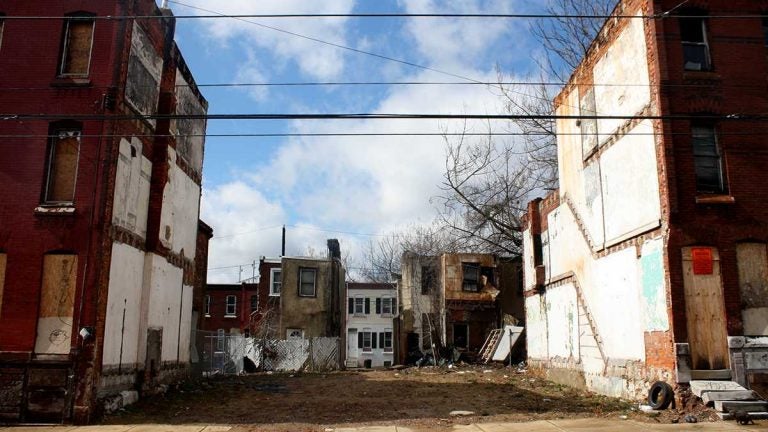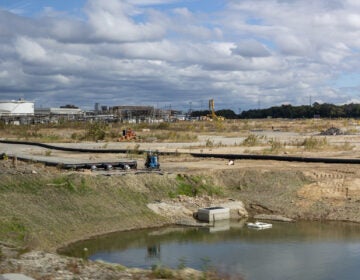Philadelphia halts most public land sales, pending reforms
The Philadelphia Redevelopment Authority has put the brakes on a large portion of public land sales.

A vacant lot in North Philadelphia. (Jared Brey/PlanPhilly)
The Philadelphia Redevelopment Authority has put the brakes on a large portion of public land sales.
The move follows a blistering Philadelphia Inquirer report that showed political meddling and chronic undervaluation endemic to the city’s land dispensation process.
Most land owned by the city is sold through an obscure process that depends on the approval of the Vacant Property Review Committee, a 14-person board with a chair appointed by Council President Darrell Clarke. The PRA, however, is charged with executing the final title transfer on such sales. While this is typically a routine step, minutes from recent PRA board meetings show that the state agency has frozen all VPRC-related title transfers since the Nov. 20 publication of the Inquirer story.
Paul Chrystie, a spokesman for the PRA, acknowledged the freeze.
“[The] PRA has decided to hold approving VPRC properties while a system that better reviews proposed sales is devised and implemented,” Chrystie wrote in an email.
Mayor Jim Kenney, who tightened regulations on the process through an executive order last month, praised the decision to freeze other sales until a new system could be established.
“My Administration – along with our partners at the Redevelopment Authority – are still in the process of developing a better set of procedures and checks regarding the disposition of city-owned parcels,” said Kenney said, in a prepared statement. “While we engage in that process, it is prudent for the PRA to hold off on approval of VPRC sales.”
Staffed by a mix of City Council and mayoral appointees, the vacant property committee has become a symbol of the city’s informal tradition of “councilmanic prerogative,” wherein district councilpeople wield outsized influence over real estate transactions and land use decisions in the neighborhoods they represent.
“Although the review committee is staffed by administration officials it is controlled by council,” Pew Charitable Trusts wrote in a 2015 report. “Its operations follow no written bylaws or guidelines, officials say, and its work gets little public attention.”
The VPRC relies on a mass property appraisal system called “LAMA,” which appears to routinely undervalue property in gentrifying areas.
The politicized process and undervaluation have contributed to the creation of a lucrative buyer’s market that deprives the city of potential revenue. One recent episode was spotlighted in the Inquirer investigation, which revealed that a childhood friend of Councilmember Kenyatta Johnson had purchased city land at well below market value through the process and resold the lots for 2.5 times their city-appraised value.
The vacant property committee approved the sale after Johnson submitted letters in support of the sales to real estate investor Felton Hayman, his longtime confidant. There was no competitive bidding process despite the fact that other developers had expressed interest in purchasing the land from the city.
Hayman purchased the lots for $39,000 in 2014 and sold them for $165,000.
Kenney’s chief of staff Jim Engler said Friday that the administration hoped to see an end to paydays that put taxpayers on the losing side.
“The goal of the system obviously is to dispose of properties quickly and with predictability and free of loopholes, allowing for the private development of vacant parcels without the possibility of a developer gaming the system,” Engler said.
Before the mayor introduced his reforms, Council President Darrell Clarke, put forward a competing set of reforms.
A spokesman for Clarke did not respond to a request for comment about the freeze on sales.
Councilperson María Quiñones-Sanchez, a political ally of the Council President and an author of the city’s Land Bank legislation, blamed the PRA and Kenney for putting numerous prospective land buyers in limbo by simply freezing the process.
“There are hundreds of folks bottlenecked in the process. Halting is not the answer,” she said.
Quiñones-Sanchez accused Kenney of failing to push for the consolidation of the city’s various land holdings –– which are scattered between Public Property, the Land Bank, PRA –– into a singular entity.
Such a consolidation would also involve Council approval, which to date has not been forthcoming for vehicles like the Land Bank, which was initially proposed by Quiñones-Sanchez for exactly this purpose. Councilmembers have only turned a small number of city-owned lots over to the Land Bank, so far.
Critics have said this is an expression of councilmembers’ reluctance to give up more direct control over vacant land in their districts and Quiñones-Sanchez said it was important to preserve some councilmanic influence to help steer lots to community members. However, she said the Kenney administration had contributed to this anxiety by not pointing to a single, streamlined system as an alternative.
“What the administration needs to do is finish consolidation of all those landholding agencies,” Quiñones-Sanchez said. “PRA, the Land Bank and Public Property are all working at cross purposes…No body on council trusts any system because there are three systems.”
WHYY is your source for fact-based, in-depth journalism and information. As a nonprofit organization, we rely on financial support from readers like you. Please give today.





